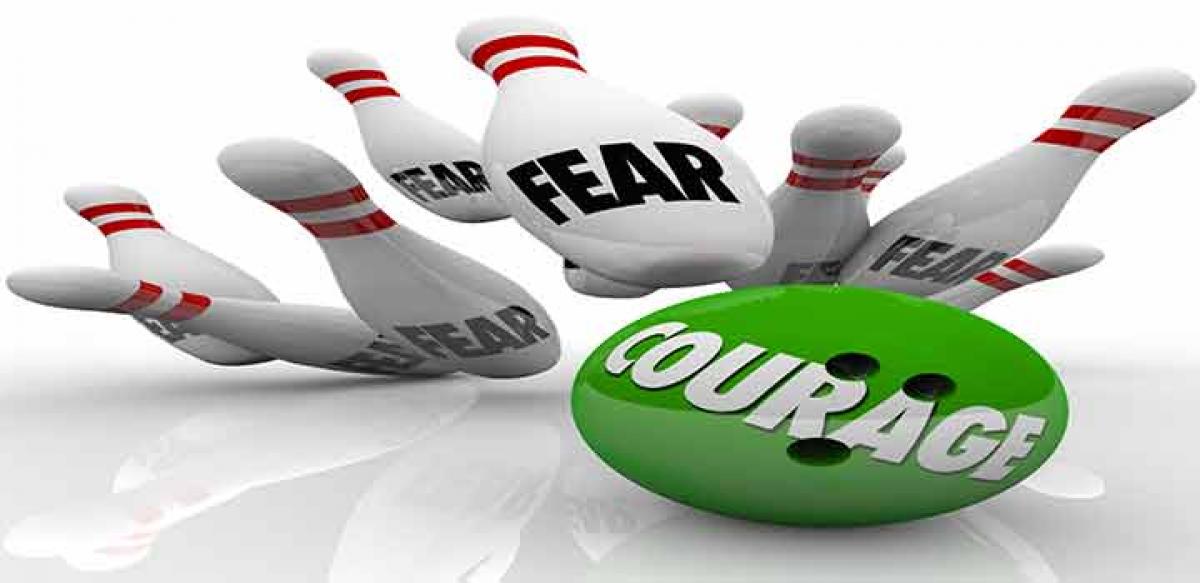Live
- Delhi court reserves orders on bail petition of Kavitha for May 6
- Konda Vishweshwar Reddy holds rally in Tandur
- Revanth fielding dummy candidates to benefit BJP: KTR
- KTR takes part in road show to boost cadre morale
- YS Jagan Credits YSR for Development in Pulivendula, rubbishes political allegations
- Empowering Patient Education: A Conversation with Naresh Ahuja, CEO of SMS Scientific Products Pvt Ltd
- One dead after car hits lorry at Muthangi Outer Ring Road in Sangareddy
- WhatsApp Update: WhatsApp Introduces Passkeys for iOS, Secure Logins Without Passwords
- Writ in HC seeking disqualification of BRS MLAs Venkata Rao Tellam, Kadiyam Srihari
- PM Modi Criticizes Congress Over Muslim Inclusion In Karnataka's OBC List
Just In

Each of us can recognise ourselves in some or all of these fears. This suggests that some degree of resistance toward compassion is as natural as the arising of compassion itself.

Each of us can recognise ourselves in some or all of these fears. This suggests that some degree of resistance toward compassion is as natural as the arising of compassion itself.
To a large extent, these fears stem from confusing compassion with submissiveness, weakness, or sentimentality. But they are unfounded. Compassion does not preclude standing up for ourselves when we are being treated unfairly. If a colleague at work attempts to discredit us so that he might get the promotion instead, we could retaliate—spread nasty rumours about him, yell at him, and so forth.
Alternatively, we could recognise where his behavior is coming from. Often, unskillful, unkind behaviour comes from insecurity rooted in jealousy. Clearly, in this case, there is misguided self-interest and shortsightedness at work too.
We can remember, when we have the urge to make this person suffer, that he is already suffering. The moment you can empathise with your colleague, you’ll be in a better position to maintain composure and respond to the situation with calm and clarity. You might approach him and try to talk to him, tell him you think you understand.
You might say that you think he, for his part, will understand why you are asking him to stop. He might surprise you by understanding. Having compassion for others doesn’t mean people aren’t accountable for their actions. We might think that some people simply don’t deserve our compassion.
Much of the tension we perceive stems from misunderstanding compassion and forgiveness. Having compassion for perpetrators of injustice doesn’t mean that we condone their actions, and it doesn’t prevent us from confronting them. If anything, it lets us deal with the situation more efficiently, without the costs of anger and enmity.
It means we never lose sight of the fact that these individuals are human beings too, and, just like us, they are trying to avoid suffering and find happiness. Even as we hold people accountable and do what we can to stop injustice, we can remember their humanity, and not lose sight of their perspective and needs.
As the Dalai Lama often reminds us, forgiving someone does not mean forgetting what he or she has done. If we have forgotten, there is nothing to forgive. Forgiveness is for the person, not for his or her deeds. This simple idea is powerfully captured in the Christian injunction that we should love the sinner but hate the sin.
Another common fear is that someone might become too dependent on us. Behind that fear, we can usually find a false belief that compassion means doing everything for that person. In fact, the most compassionate thing we can do is to help empower others to draw from their own inner resources teach a person to fish instead of giving him a fish, as the saying goes. Helping others help themselves is one of the highest forms of compassion.
We might also resist compassion out of fear that we won’t be able to cope with another person's distress, since compassion involves opening ourselves to others’ suffering (and don’t we feel stressed enough already?). This fear may come from not knowing what to do when we’re confronted with a problem as that cannot be fixed. Many of us, especially men, are uncomfortable with problems that have no clear solution.
Compassion acknowledges the fundamental truth of our human condition that not all pain can be fixed, and that there is a limit to what each of us can do in the face of suffering. It calls for an attitude of humility. In many situations, it’s not fixing that is needed; rather, it’s our empathic response, our acceptance, understanding, and solidarity.
Sometimes, someone just needs a “yeah, that sucks” or a hug. In any case, it’s always helpful to remember that some pain and sorrow are unavoidable, part of what it means to be human. It’s not up to us to say whether, but we can choose how we respond. Do we resist the reality of suffering with anger, denial, or detachment?
Are we gripped with thoughts like “Why me?” or “It’s not fair!” or “I can’t deal with this,” which only add suffering on top of suffering? Or can we respond with understanding, compassion, and courage? This is our choice.
Thupten Jinpa, former Tibetan monk and author of ‘A Fearless Heart’

© 2024 Hyderabad Media House Limited/The Hans India. All rights reserved. Powered by hocalwire.com







